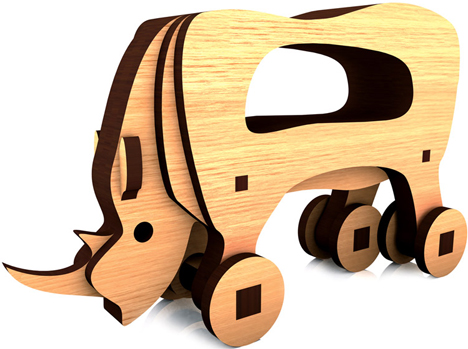Can You Podcast Physical Things?
Sep 30th, 2009 | By James Lewin | Category: Citizen Media, General, Podcast Distribution, Podcasting  Can you podcast physical things?
Can you podcast physical things?
Most people think of podcasting in a fairly limited sense. – for example, radio shows that you can download automatically.
We’ve always had a broader view, that podcasting was the publishing of downloadable files with an RSS 2.0 news feed. With that in mind, you can use podcasting to automatically stay current with all types of files, through audio podcasting, video podcasting and, more generically, document casting.
In each case, podcasting is being used to make it easy to get the latest version of something – whether it’s a radio show, a song download, a new video or some other file.
Why not podcast physical things, though?
We’re moving into an era where on demand manufacturing is becoming commonplace, and DIY’ers are buying 3D printers that can print actual physical objects on demand. The children’s toy, above, is an example of what a company called Ponoko does – on demand manufacturing.
This technology is very expensive now – but the 300 DPI Apple LaserWriter cost $6,995 when it came out, and now companies give high-resolution printers away to get you to buy ink cartridges. On-demand object printers are going to rapidly become affordable, too.
Is there any reason podcasting can’t be used to distribute the latest versions of files that create things, just as easily as podcasting is used to distribute the lastest versions of an audio show?
What do you think? Futuristic or just fantasy?
We used to distribute Podcast User Magazine as a PDF attached to an RSS feed. It worked very well too. There is nothing to stop anyone from sending any kind of file down an RSS feed as an OPML attachment so you WILL be able to do this. Bring it on.
Could this lead to people pirating cars? 🙂
What's being copied isn't the actual item, it's the blueprints for those items. And that's already being done, and has been done for years, with papercraft. However, since it's only the plans that are being distributed, people still have to supply the materials and the labor of assembly. So I don't think this would take off for most items.
And as for "podcasting" it, that's not the most reasonable way to distribute it. It is possible to post a link to a plan in a feed, but podcast catchers are setup for audio and video, not documents.
Patrick –
Isn't an MP3, then, just a "blueprint" for the music you listen to?
Music isn't a physical item, it's an event. It's the variation of harmonic tones over a period of time. MP3s are just data mapping those events so they can be reproduced through a computer's sound system.
Dude – how is that any different than podcasting files that do other types of work?
An MP3 file controls the work that you computer speakers do. Did the music get podcast? Not really – just a file that controls what your speakers do.
How is this different than podcasting a file that controls what your laserprinter does, or what a 3D printer does?
There is no such thing as podcasting a "Physical Thing!"
It didn't work that way even on Star Terk©
If you have the appropriate output device, you can provide instructions to that output device to reproduce anything which it can possibly reproduce.
A 3D printer, a chip fabber, a printer, an audio and/or video device, or anything that can react or cause a reaction with a human agent, can be digitally controlled.
It comes down to digitally reproducing the instructions to the fabricators.
These instructions can be stored in digital files and distributed via the internet, synched via RSS and are entitled to the same legal copyright protections that currently exist.
The problem is not whether you can copy something or not. You can always copy, but are you legally entitled to and allowed to copy.
You can always out on an eye patch, shout 'ARRGH!" and make an illegal copy when you're not granted permission, but you really shouldn't.
The problems we all have with copyright are that those rights, and the owners of those rights, aren't made explicit at the TimeOfPurchase and at the PointOfPurchase.
Basically, when you plunk down your twenty bucks for a CD, you have NO IDEA of the actual distribution of the money. Your ignorance in this respect is quite shameful.
If you KNEW how much of the money was going and to whom, you'd probably pick the one that gives the artists/author/designer/creator the most money.
Right now, you're "Buying a Pig in a Poke."
You have no choice, but you bear all of the responsibility.
Given two albums (I'm talking "old school" here,) one of which was going to pay the artist (say Chuck Berry,) and the other one was going to pay some rights holders (say a bunch of dentists in Albuquerque who'd bought the rights to the songs,) I supposed that you'd probably pick the one that was going to give the most money to the estate of "The Hardest Working Man In Rock & Roll ! "
We are rapidly reaching the stage of the "Universal fabber" where we will be able to copy anything with how ever much resolution as deemed necessary.
At Dr. Floyd we've done several PDF print & Cut toys for our listeners. More on the way.
[…] « Can You Podcast Physical Things? […]